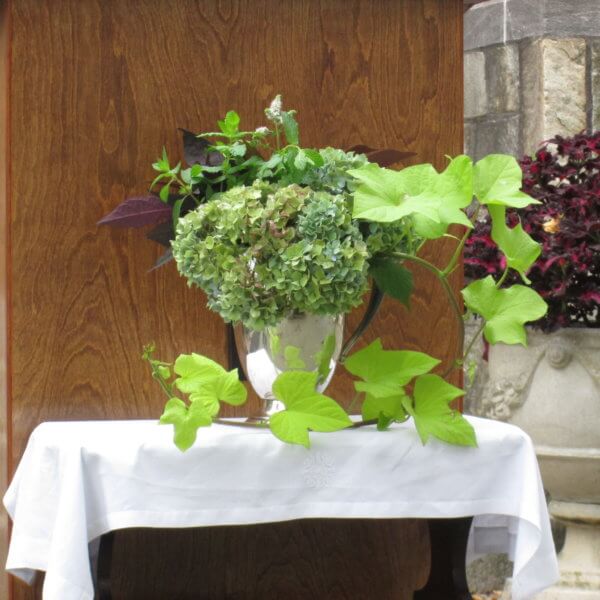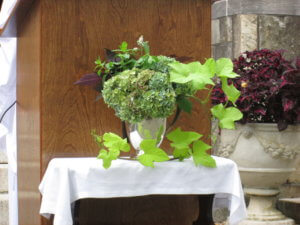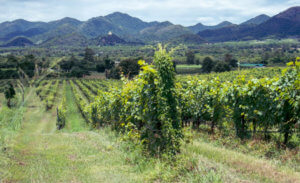
The Extravagant and Inefficient Landowner and the Notorious RBG
 It seems that after the heat of August and early September, the nights are cooling. The hydrangeas that were brilliant blue in July are now gorgeous subtle shades of deep aubergine, with some pale green and others a smoky blue. When Jere and I go out to watch the sun set in the clouds over Jamestown from Brenton Point, I take a sweatshirt now instead of sitting easily in the summer evening breeze. And we see that in this morning’s worship as well. We’ll talk some more about this at our Family Meeting today, but I know it’s chilly out here.
It seems that after the heat of August and early September, the nights are cooling. The hydrangeas that were brilliant blue in July are now gorgeous subtle shades of deep aubergine, with some pale green and others a smoky blue. When Jere and I go out to watch the sun set in the clouds over Jamestown from Brenton Point, I take a sweatshirt now instead of sitting easily in the summer evening breeze. And we see that in this morning’s worship as well. We’ll talk some more about this at our Family Meeting today, but I know it’s chilly out here.
Fall is upon us. The fall equinox is coming up this Tuesday, and we can already feel the chill in the air. Late August through mid October is the time that vineyard owners harvest their grapes for wine, and even the vineyards on Aquidneck Island are harvesting now. Have you ever had the opportunity to watch or help harvest grapes in a vineyard? In most places now, it’s done with machinery for efficiency and even more careful handling of the grapes and the vines, to keep the vines fruitful and the business profitable.
Paul Nunes, one of the brothers who owns and operates Newport Vineyards, drives the harvester himself. My mother was a Home Ec. teacher for many years in the Fingerlakes wine region of Central New York, and many of her students missed school every fall to work the harvest. Many of them came from families who really needed their income to help feed the family, so missing a couple of weeks of school was a necessary sacrifice to the kids’ education for the greater good of the family’s economic survival.
The Landowner
 What, then, is going on in Matthew’s gospel today? Who is this landowner who manages his work flow in such a wasteful, inefficient way, and then treats his workers unfairly at the end of the day? Has he managed his vineyard productively and well? Why would a wise and fair landowner set up such an inequitable pay structure?
What, then, is going on in Matthew’s gospel today? Who is this landowner who manages his work flow in such a wasteful, inefficient way, and then treats his workers unfairly at the end of the day? Has he managed his vineyard productively and well? Why would a wise and fair landowner set up such an inequitable pay structure?
Look at it from the laborers’ point of view: one group works from early morning to evening in the hot sun, bending over with their aching backs to pick and carry the heavy, ripe grapes. The last group of pickers were hired in the market about an hour before quitting time. By the time they got to the vineyard, they probably only had enough time to pick up a basket and gather a bunch or two of grapes before the work day was over. Isn’t that just a quick way to start a labor dispute and run your business into the ground?
Anyone who has ever been an older brother or sister knows this feeling of envy, right?Maybe you had more responsibilities because the younger ones weren’t old enough yet to help around the house. Or maybe you had to wait for a long time for a special privilege — to have a later bedtime, or maybe even to borrow the car. But then your parents were more relaxed, and the younger ones got the privilege without having met the same goals, or had the same number of birthdays. But maybe some of you have experienced this dynamic from the parent’s or grandparent’s side — when you realize how important the family time or special experience would be for the younger ones who would miss it without a later bedtime. And that a little nap the next day smooths over any of the bumps that the rule was meant to deal with in the first place.
The Parable is About You
Where do you stand in this parable? Who is the landowner? Who is this parable about? Berkeley Divinity School’s dean Andrew McGowan often says, keep in mind the parable is always about you. We’re meant to try on different shoes — to stand in the places of all of the actors in the parable to understand the human dynamics.
Jesus sets this idea up in Matthew’s gospel by making sure we’re focused on feeling shortchanged and overlooked. He gets us identifying with the workers. Isn’t it easy to identify with the workers who have been wronged in this scenario? The ones who got their work clothes ready early the night before, went to bed on time, got to the market early, and were there looking all bright eyed and bushy-tailed when the landowner hired for the day. Because the early bird gets the worm, right? In telling this parable, Jesus is touching every last sensitivity we’ve ever had about being treated unfairly — whether as children in a family or at school (No fair!! Why did I get detention when he was late too? OR I’m always picked last for the team!), or workers who are paid less, or passed over for promotion, or furloughed first in COVID time. So it’s really easy, right, to be drawn up into a tight little knot of outrage reading this parable.
So what’s our clue in this parable that makes us stop and take a closer look — to shift our perspective and look at the parable a different way? Let’s take a look at the landowner. He heads out to hire his workers for the day in the marketplace at daybreak. He negotiates a day’s wage with them. So far so good.
How is it that about three hours later, the landowner has walked all the way back to the market and hired more workers? Didn’t he know what his crop looked like, and isn’t he familiar with how long it would take a certain number of workers to pick and glean his vines? Jesus’ whole point of beginning in the parable is to describe what the kingdom of heaven is like.
The Kingdom of Heaven is Like . . .
And that’s where Jesus starts: The kingdom of heaven is like a landowner who went out early in the morning to hire laborers for his vineyard. After agreeing with the laborers for the usual daily wage, he sent them into his vineyard. BUT that’s not all. The landlord returns to the market at 9am, noon, and 3:00 in the afternoon, and again at 5:00, just before quitting time. Five times in one work day this landowner hires laborers. That’s what the kingdom of Heaven is like. Jesus turns our expectations around.
While we’re feeling all peevish and remembering every unfairness we’ve ever experienced, where someone else was picked first or paid more, Jesus is telling us that the kingdom of heaven is like: An extravagant and inefficient landowner who makes 5 separate trips to the marketplace to hire every last worker who needed work — even those who weren’t there bright and early, but who had to care for a sick parent or child, or who had to walk several miles to catch a bus to get there, or didn’t look fit and strong because they didn’t have enough to eat at home. And even for those who were women, or from a religious or ethnic minority — different from the landowner’s background. This landowner is as bad a businessperson as the sower of seeds in the parable we read in August. That guy sowed seeds everywhere! Even on rocky ground where they couldn’t possibly grow.
Death of Ruth Bader Ginsburg
 We lost an American hero Friday night, the first night of Rosh Hashanah, the Jewish New Year. Ruth Bader Ginsberg, the second woman to serve on the U.S. Supreme Court and an observant Jew, died of cancer Friday at the age of 87. Friday night, on the steps of the United States Supreme Court, a woman sang the Kaddish — a traditional Jewish prayer for the dead — in Hebrew as mourners gathered to honor RBG. Some people say that, according to Jewish tradition, a person who dies on Rosh Hashanah is a tzaddik — a person of great righteousness.
We lost an American hero Friday night, the first night of Rosh Hashanah, the Jewish New Year. Ruth Bader Ginsberg, the second woman to serve on the U.S. Supreme Court and an observant Jew, died of cancer Friday at the age of 87. Friday night, on the steps of the United States Supreme Court, a woman sang the Kaddish — a traditional Jewish prayer for the dead — in Hebrew as mourners gathered to honor RBG. Some people say that, according to Jewish tradition, a person who dies on Rosh Hashanah is a tzaddik — a person of great righteousness.
The Notorious RBG, a popular nickname her friends said delighted her, would have understood the parable of the Extravagant and Inefficient Landlord in the kingdom of Heaven, even though — like Jesus — she was Jewish. In the kingdom of Heaven, a tiny (maybe 85 pounds soaking wet), brilliant, powerful, Jewish woman, who graduated with top grades from Columbia Law School — after completing two of three years of law school with top grades at Harvard, but still couldn’t get a job at a law firm, or teaching in a law school, who was picked last, paid less, mansplained, and overlooked for decades, served with overwhelming competence, intelligence, good humor, and honor on the highest court in our land, is honored as a tzaddik — a person of great righteousness.
In the kingdom of Heaven, where the Extravagant and Inefficient Landowner upends expectations with big, wasteful, expansive inclusiveness, the last will be first and the first will be last. That’s what the kingdom of Heaven is like. Amen
Family Meeting
- Ok, so it seems that the seasons have changed. At least for these next days, but we may have a couple more warm Sundays.
- One of the effects of COVID time, and following the Rhode Island reopening requirements and the requirements that the Diocese has for us is that our service needs more greeters and ushers and volunteers than our regular services do.
- And for a longer time — the volunteers need to be able to set up and put things away, so for today’s 9:00 service, everyone was here by 8:00 or so and will stay for about 30 minutes after the service. So you can see that recruiting enough people as volunteers for TWO services each Sunday could be a challenge.
- That leaves us with a single service. And now it’s getting cold.
- There are also reopening protocols for inside the church that currently require complete sanitization between services, which would make two services even more difficult to manage from a time and volunteer standpoint.
- And also we have had some damage to one of the clerestory windows in the church, and it’s not safe to be in there until it’s fixed, but the repair is underway.
- Remember that even when we are inside, it won’t be cozy and warm as we like it — we’ll need to keep all the doors and windows open for air circulation.
- SO HERE’S THE question: May I please have a show of hands of those who would prefer to have this service at 10:00? I know that there are people here who like the 8:00 service, and those who are 10:00 folks — so one service will always be a compromise, but may I see among those who are coming to this service whether you would prefer to have the service at 9:00 am or at 10:00 am?
